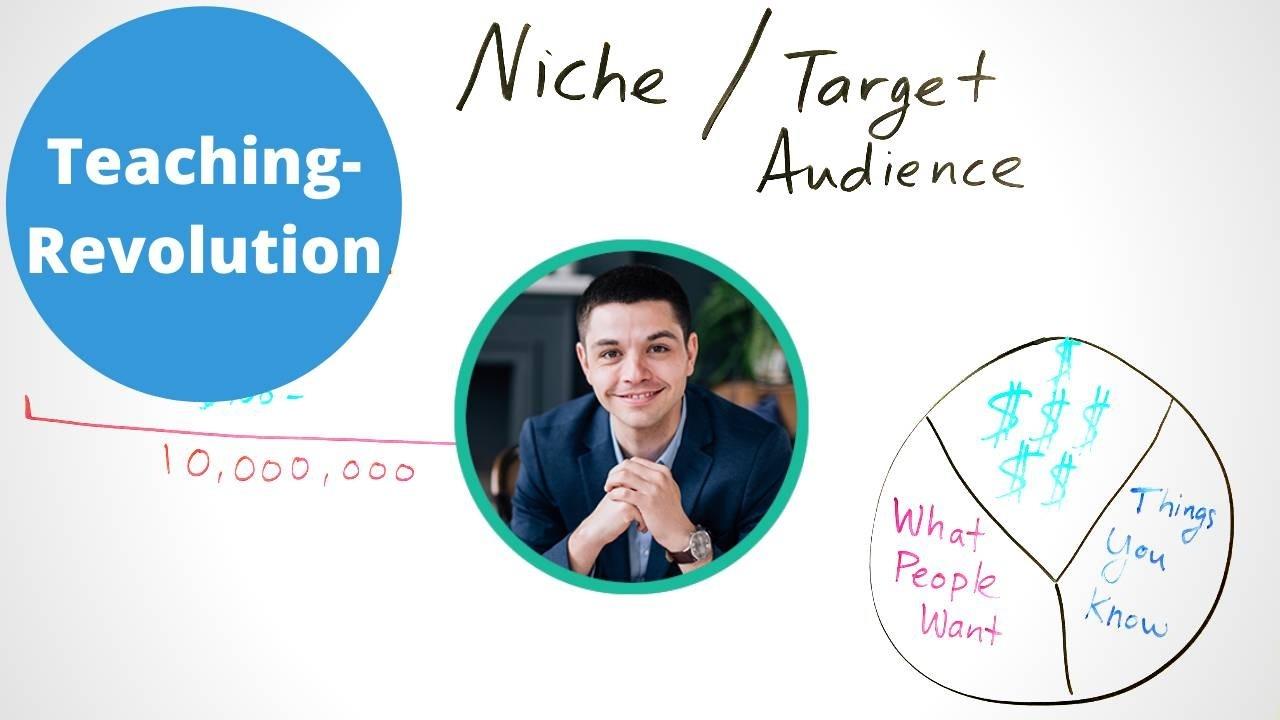Finding Students | Defining Your English Teaching Niche and Target Audience

When starting to teach English online or getting started as an independent online teacher focusing on a particular area of knowledge or skillset is of the utmost importance. Most online teachers start out by selling anything and everything, which is a mistake, because it devaluates their offerings and it doesn't communicate to potential clients that they are the go-to authority on any one topic or sphere. It's also very difficult to compete in every sphere simultaneously.
Consider the example of doctors who work in a hospital. There are general practitioners, pediatricians, brain surgeons, and many other types of doctors. The more specialized the doctor is, the more the doctor earns per hour or per procedure performed. On top of that, many people believe that, in order to be a successful brain surgeon, you have to be a genius or at least at very high-level expert. And while people don't necessarily think that general practitioners aren't smart, they don't typically achieve the rockstar status that brain surgeons and other highly specialized doctors do. (check out the average salaries of different types of doctors here)

You see, it's almost impossible to become the best in the world at absolutely everything. But it's quite easy to become the best in the world at something very specific.
And the good news is that you don't have to be a genius or a brain surgeon to achieve rockstar-like success. All you need to do is specialize and focus on solving particular problems for a particular group of people. That's where the term niche comes in.
How can I define my niche?
Moving beyond the dictionary definition of the word niche, we typically define a niche as a specialization, speciality, or even a vocation or calling. And, in the same way that we cannot properly define yin without yang, knowing your niche involves knowing your target audience. Probably the best place to start when determining what your niche is or which niche to choose is demographics. By creating a profile of who your target audience members are and who usually participates in the activities associated with your niche, you'll develop a clear idea of what and who your niche consists of.
The niche - target audience dichotomy
So, on one side you've got your niche, which is your specialization, your expertise. And on the other side you've got your target audience, which is the people who are interested in your product or services, or put more succinctly - the people who have a problem that you are the expert at solving.
It's important for us to discuss both of these terms, niche and target audience, in tandem because a niche is useless without a group of people who are serviced within that niche. Similarly, an audience group is useless if there is no commonality among the audience group members that allows us produce results for them.

Demographics
What qualities, characteristics, or even life choices separate your target audience from other groups of people in the world? Using general demographic information can help us here.
Here are some demographics that I find useful when trying to narrow down niches:
- geographic location
- language spoken
- parent, mother, father
- profession
- gender
- age

We don't have to use all of these different categories to determine our niche and target audience group. In fact, we typically only need to focus on one or two of them. For example, if we teach children, then it's important for us to target people who have children (a.k.a. parents) when marketing and selling our products or services. It's unlikely that people without children are going to buy products for children (although they may buy them for other relatives who are children).
If we teach Russian speakers English, then we should target people who speak Russian. That should be obvious, but you'd be surprised how many people forget that when they arrive at the stage of their business where they need to launch advertising campaigns. (here are some other money making niches)
Is my niche good?
There are three major determining factors that we should consider in order to really know if a particular niche is a good idea to pursue or not. I call it the trifecta. Sure, most niches have an audience that has a problem they want solved and many of those audience members are ready to pay for that solution. But not all niches are created equal.

Let's take a look at the most important factors when choosing which niche to focus on:
The niche trifecta
- What people want - if people don't want what you've got, then it isn't very valuable.
- What people will pay for - if they won't pay for what you've got, then it doesn't help you.
- What you know (or can easily learn) - if people want something and they are ready to pay for it, but you can't give it to them, then either it's not your niche or you need to learn how to give them what they want.
The best niches are an overlap of these three things.

In fact, most people make the mistake of approaching finding their niche very differently. Unfortunately, many of those who start teaching English online choose a niche based on what they personally want or enjoy.
It's super important to remember:
IT'S NOT ABOUT YOU. IT'S NOT ABOUT WHAT YOU WANT.
Of course, if it's illegal, dangerous, sketchy, etc., then we don't want to be in that niche. But, overall, by focusing on solving problems and by finding an overlap of the three things listed above, you'll be able to find a niche that's both interesting and profitable.
How big should my niche or target audience group be?
The question about niches that I hear the most often from those who are getting started teaching English online is how big should my niche be?
It shouldn't be too big. And it shouldn't be too small. So, how big should it be?
This is where opinions online differ. Luckily, I've coached hundreds of teachers and helped them start a teaching business online and I've found an answer that will give you clarity.

Typical target audience size for a product that is on the low side of expensive
If your product costs around $500 or $1,000, then you will need a target audience group that consists of about 1,000,000 members worldwide. It can be larger or smaller, but 1,000,000 is a good number to aim for. And remember that this number refers to all members of that group in the world.
So, if you're targeting mothers who want their children to learn English - well, there are probably more than 1,000,000 members of that group in the world. We're not talking about an actual group, like a Facebook group. I mean there should be about 1,00,000 total people in the world who fit this description. And "mothers who want their children to learn English" is too broad.

Think of it like this:
You will probably only sell your product to 1% or less of the total audience group.
If your target audience group consists of 1,000,000 people and you sell to 1% of those people, then you've got 1,000 clients.
If your product costs $1,000, then you've made $1,000,000.
It doesn't mean you will get all 1,000 clients in the first month or even in the first year, but now you have a quantifiable goal to aim for.
High ticket online English products
Different people have different definitions of what high-ticket products are. I define them as products that typically sell for $5,000 or even $10,000 and up.

First of all, those who can afford such products are a smaller percentage of the population, so naturally the target audience size is reduced. Our list of demographics didn't include income as a factor, but for high ticket products it's an important one.
When you teach English online you can sell high ticket English products by targeting a smaller niche and really specializing. Some of the best examples are teachers who focus on the IELTS or TOEFL exams. But I've also seen online English teachers specialize in teaching English for special purposes and successfully sell high ticket online English products.
Because the price is so high, the niche is more specialized. So, if you are selling a high-ticket online English program, your target audience group will probably have 100,000 worldwide members or less (I've even seen people teaching English online target a niche as small as 10,000 and still sell this type of product successfully).

Lowball offers and cheap online English teaching products
Most teachers who want to teach English online offer cheap products that are sold for less than $100. Some online English courses are sold for $20, $10, $5, or even $1.
When we offer a very cheap product our target audience group should have a lot of members. Our example of mothers who want their children to learn English is a great example here. 10,000,000 target audience members is healthy size when selling low-priced offers because you will need a lot of customers if you want to earn any profit.

While it seems tempting to offer the lowest price, remember that most people who teach English online think the same way, which creates a lot of competition. After all, cheap products don't take long to create, you don't have to design a sophisticated marketing message that communicates high value, and there are so many target audience members that your chances of getting at least one or two sales are high.
Bringing it all together
If you're serious about teaching English online or teaching any other subject online, then choosing a niche is an important task. In our increasingly digitized, 21st century world the term niche itself has become a buzzword that any and every coach, consultant, trainer, and wannabe entrepreneur tries to define in their own way. In fact, that may be what you brought you to this article in the first place!
That's why it can be hard to cut through the noise and focus on what matters when completing the task of defining, identifying, and then implementing your niche and target audience market research. My advice is this: keep it simple.

We also have an interactive exercise in our free 7-day training program that you may find useful and we make sure that each and every member of our Teaching Business Catalyst program is laser-focused on their niche using several in-depth tools we've designed to make choosing a niche as simple as possible.

